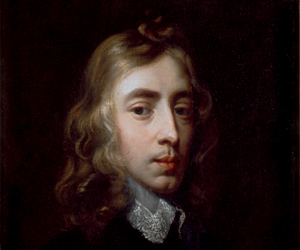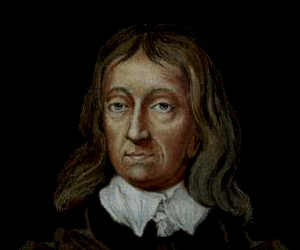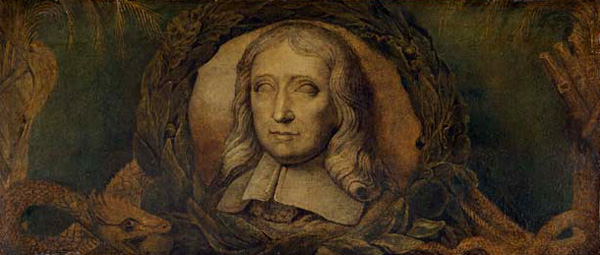John Milton
1608 - 1674
The Author
John Milton was born in London in 1608. His father was a prosperous Puritan convert from a Catholic family. He was educated at Saint Paul's School and Christ's College, University of Cambridge. At Christ's College he began to write poems in Latin, Italian and English. After taking his MA in 1632 he prepared himself for his poetic career by entering upon an ambitious program of study in European, classical and patristic literature. From 1638 to 1639 he undertook a Continental tour, where he met Galilei and Grotius. After his return to London he wrote a series of social, religious, and political tracts. In 1642 he married Mary Powell, who left him after six weeks. He was reconciled with her in 1645 and she gave birth to three daughters and a son before her death in 1652. In his pamphlets, Milton supported the parliamentary cause in the civil war between Parliamentarians and Royalists. In 1649 he was appointed foreign secretary by the government of the Commonwealth. He became totally blind about 1652 and thereafter carried on his literary work helped by an assistant. In 1656 he married Katherine Woodcock, but she and her daughter died two years later. After the Restoration copies of his works were publicly burned and he was punished for his support of Parliament by a massive fine and a short term of imprisonment. Milton died in 1674.
«The reason Milton wrote in fetters when he wrote of Angels and God, and at liberty when of Devils and Hell, is because he was a true Poet and of the Devils party without knowing it.» (The Complete Poetry and Prose of William Blake, 1982, p. 35)
John Milton by an unknown painter (Collection of Christ's College), by William Nelson Gardiner (Collection of Christ's College), by William Blake (Manchester Art Gallery)
The Works
Apologus de rusticus et hero (1625) Verses from Milton's Commonplace Book (1625) In Quintum Novembris (1626) >>> On the morning of Christ's Nativity (1629) >>> On Shakespeare (1630) Sonnet III (1630) Sonnet VII (1631) L'Allegro (1631) >>> Il Penseroso (1631) >>> Arcades (1633) Lycidas (1637) Comus, A Mask (1637) >>> Epitaphium Damonis (1639) >>> Of Reformation (1641) >>> Of Prelatical Episcopacy (1641) >>> Animadversions (1641) >>> The Reason of Church Government (1641/42) >>> Adam Unparadized (ca. 1641/42) An Apology for Smectymnuus (1642) >>> The Doctrine and Discipline of Divorce (1643) >>> The Judgement of Martin Bucer Concerning Divorce (1644) >>> Tetrachordon (1644) >>> Of Education (1644) >>> Areopagitica (1644) Colasterion (1645) >>> In Effigiei eius Sculptor (1645) Poems of Mr. John Milton, Both English and Latin (1645) >>> Tenure of Kings and Magistrates (1649) Observations upon the Articles of Peace with the Irish Rebels (1649) >>> Eikonoklastes (1649) >>> Pro Populo Anglicano Defensio (1651) >>> Sonnet XIX (1652/55) Defensio Secunda (1654) >>> Defensio Pro Se (1655) >>> Sonnet XVIII: On the Late Massacre of Piemont (1655) A Treatise of Civil Power in Ecclesiastical Causes (1659) >>> The Likeliest Means to Remove Hirelings from the Church (1659) >>> The Ready and Easy Way to Establish a Free Commonwealth (1660) >>> Sonnet XXIII (ca. 1660) Brief Notes Upon a Late Sermon (1660) >>> Paradise Lost (1667) Accedence Commenced Grammar (1669) >>> The History of Britain (1670) >>> Paradise Regained (1671) >>> Samson Agonistes (1671) >>> Artis Logicae plenior Institutio ad Petri Rami... (1672) >>> Of True Religion, Heresy, Schism, Toleration (1673) >>> Psalm Paraphrases (1673) >>> Poems (1673) >>> Paradise Lost (Second edition, 1674) Epistolarum Familiarium Liber (1674) >>> Prolusiones quaedam Oratoriae (1674) >>> Character of the Long Parliament (posth. 1681) A brief History of Moscovia, and other less known Countries (posth. 1682) >>> Letters of State (posth. 1694) >>> De Doctrina Christiana (posth. 1825) >>>
Appendix
Miltons Verlust des Paradieses (German translation 1732) John Milton 400th Anniversary Celebrations 2008 |


